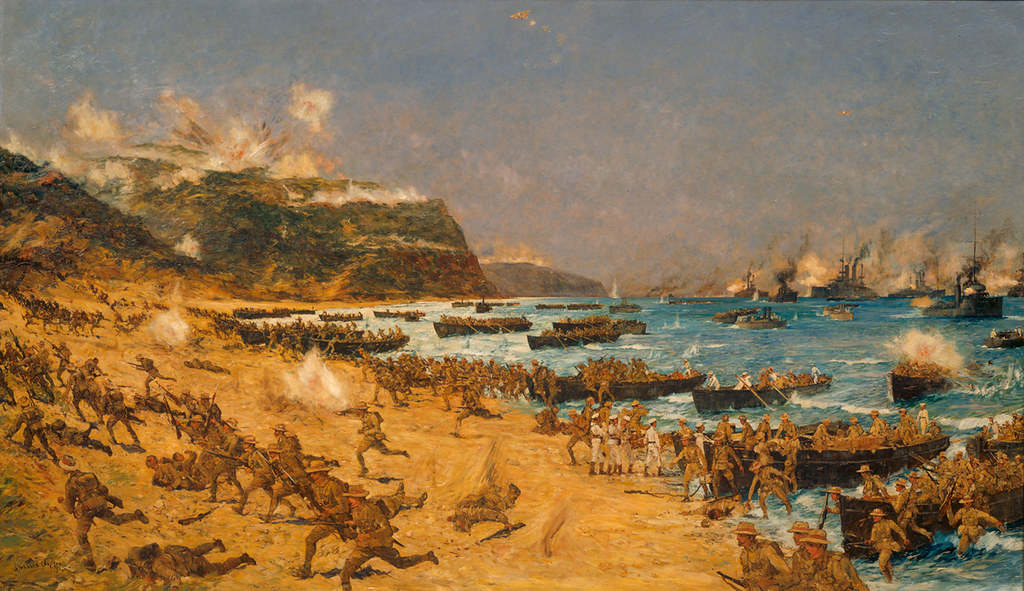Monday – Anzac Day
Today is the day that Australia and New Zealand remember their war dead, it being the anniversary of World War I’s Battle of Gallipoli. An expeditionary force made up of many Australians and New Zealanders landed at the Turkish Dardanelles on April 25, 1915, and the subsequent campaign would cost both sides a combined 250,000 casualties before the Turks emerged victorious. Just a few months ago we thought such carnage was behind us, only to see World War-style horrors return to the world stage.
Following another 1914 battle, this one where the Germans defeated the British at the Battle of the Mons, Laurence Binyon wrote “For the Fallen.” The fourth stanza is frequently quoted at occasions like Anzac Day:
They shall grow not old, as we that are left grow old:
Age shall not weary them, nor the years condemn.
At the going down of the sun and in the morning
We will remember them.
While I love that stanza, the rest of the poem has sometimes struck me as romanticizing death in battle, the way that Tennyson’s “Charge of the Light Brigade” romanticizes it. (I express some of my reservations about such romanticizing here). I’ve always been more drawn to the poetry of Wilfred Owen, who exposes it. In his poem “Dulce et Decorum Est,” for instance, he refers to the poetic line of the Roman poet Horace—“Sweet and fitting it is to die for one’s country”—only to call it a lie. If you could see a man dying of poison gas, he tells the reader,
you would not tell with such high zest
To children ardent for some desperate glory,
The old Lie: Dulce et decorum est
Pro patria mori.
The Ukrainians defending their homeland, however, has me thinking differently. Just because we acknowledge the horrors of war does not mean that we should close our eyes to combat heroism. “Unhappy the land that is in need of heroes,” says Galileo in Brecht’s play of that name, but when the times are indeed unhappy, we must honor those who step up. I find myself thinking of those brave souls defending Mariupol against impossible odds. When tyrants strike, brave acts are called for, and that’s what Binyon’s poem honors.
So here’s to all those who fall “in the cause of the free.” As Binyon puts it, “they are known as the stars are known to the Night,” and “to the end, to the end, they remain.”
For the Fallen
By Laurence Binyon
With proud thanksgiving, a mother for her children,
England mourns for her dead across the sea.
Flesh of her flesh they were, spirit of her spirit,
Fallen in the cause of the free.
Solemn the drums thrill; Death august and royal
Sings sorrow up into immortal spheres,
There is music in the midst of desolation
And a glory that shines upon our tears.
They went with songs to the battle, they were young,
Straight of limb, true of eye, steady and aglow.
They were staunch to the end against odds uncounted;
They fell with their faces to the foe.
They shall grow not old, as we that are left grow old:
Age shall not weary them, nor the years condemn.
At the going down of the sun and in the morning
We will remember them.
They mingle not with their laughing comrades again;
They sit no more at familiar tables of home;
They have no lot in our labor of the day-time;
They sleep beyond England’s foam.
But where our desires are and our hopes profound,
Felt as a well-spring that is hidden from sight,
To the innermost heart of their own land they are known
As the stars are known to the Night;
As the stars that shall be bright when we are dust,
Moving in marches upon the heavenly plain;
As the stars that are starry in the time of our darkness,
To the end, to the end, they remain.
Added note: I just discovered that Rupert Brooke died on his way to Gallipoli, being felled by an infected mosquito bite on April 23, two days before the landing. His well-known poem “The Soldier” contributes to the romanticization that I have always been wary of. And yet, in the current situation, I can imagine it bringing solace to those Ukrainians battling the Russian invaders.


